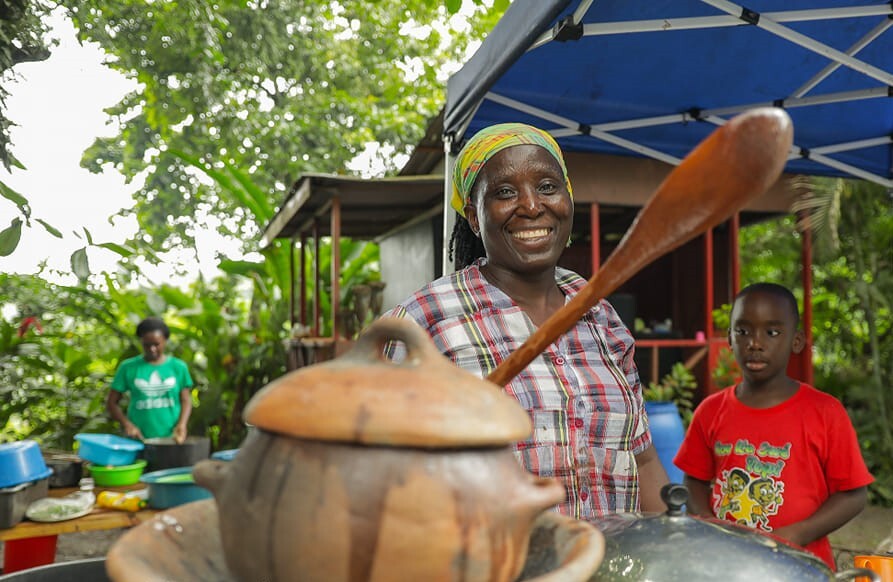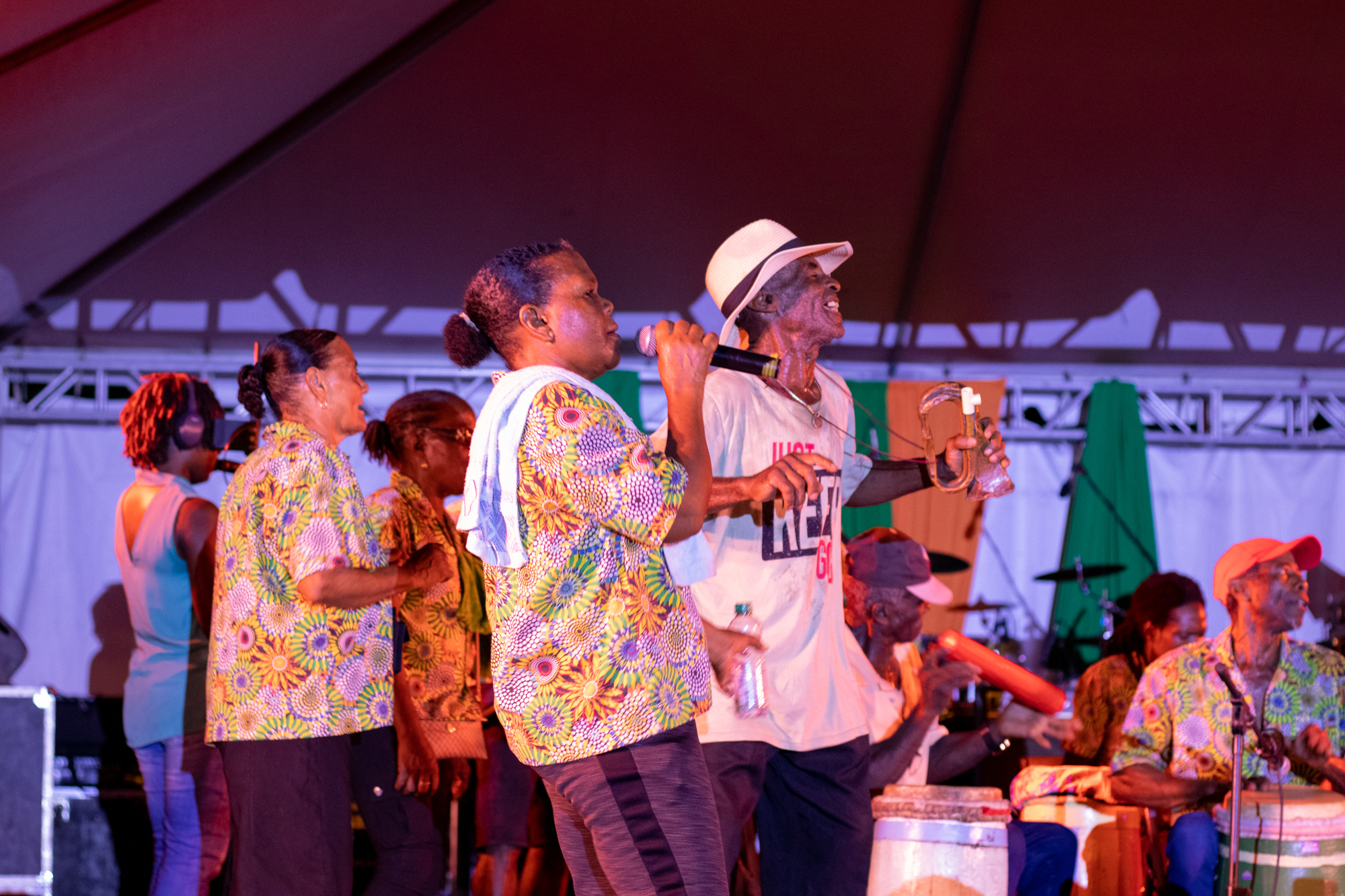Arguably, Jounen Kwéyòl is one of the biggest national cultural celebrations in Saint Lucia, ranking in prominence on the calendar of events with the Saint Lucia Jazz & Arts Festival and Carnival. However, unlike jazz and Carnival, Jounen Kwéyòl is not as heavily dependent on the arrival of visitors for its success.
The event thrives primarily on local participation. It has also mushroomed over the years, with numerous satellite activities among the Saint Lucian diaspora in places such as Atlanta, Miami, New York, Washington, Toronto, and London and on school campuses with Saint Lucian students.
The push towards this celebration came from the local organisation Mouvemen Kwéyòl Ste Lisi and the international group Banzil Kwéyòl. Following years of advocacy and education, the idea to have a day set aside to recognize the Kwéyòl language and culture was embraced by UNESCO.
Former director of the Folk Research Centre (FRC) in Saint Lucia, cultural activist and linguist Kennedy Boots Samuel was part of the initial movement, which he describes as revolutionary.
“Those of us involved started by popularising the thinking of the importance of Kwéyòl, taking it from the strictly academic and intellectual and opening up the thinking and discussions among ordinary Saint Lucians, the Kwéyòl speaking masses,” Samuels told the St. Lucia Times.
The discussions he says, at first focused on the language — where it was going, its status and importance to the society.
“Among the people it was more about trying to bring out their attitudes towards the Kwéyòl language and for us to have real encounters with the language and culture and that was the thinking behind establishing a day to celebrate Kwéyòl. It was so that people could come out and encounter, if they had never done so before, the Kwéyòl language and Culture,” Samuels said.
“And to our surprise the response at first was literally revolutionary, it exploded in terms of the response. It was as if all along there were these undercurrents of our Kwéyòl that people wanted to express but probably they did not know how to, or were suppressed due to the fact that the language was frowned upon by some,” he adds.
Samuels recalls the radio programs put on by Moveman Kwéyòl to generate discussions.
“The calls started coming in regularly from all over the island, we got all kinds of information about the language and the culture and from a cross section of the society, not just the linguist and everyday people,” he says.
The discussions soon received regional and international backing of UNESCO. In 1983 and in 1984 the first national celebration, Jounen Kwéyòl Entenasyonal (International Kweyol Day), was held in Saint Lucia in the community of Mon Repos with the idea of having a centralised location each year for the celebration.
“Mon Repos was huge, but I must say by the time we did the second one the following year it was like the whole of Saint Lucia descended on Fond Assau where it was held,” Samuels reveals.
Despite what was taking place Samuels says there were still some detractors who felt that the Kwéyòl language had no place in modern society.
However, the recognition of Kwéyòl day continued to thrive with the support of Banzil Kweyol.
Today, besides Saint Lucia, Jounen Kwéyòl is celebrated in the Commonwealth of Dominica, Martinique, Guadeloupe, Haiti, French Guyana/Cayenne, Seychelles, Mauritius, and Reunion.
Activities are now held in various communities as opposed to one central location. By 2020, it was also decided that the entire month of October would be dedicated to Kwéyòl giving birth to Mwa Éwitaj Kwéyòl or Creole Heritage Month.
The month comes alive with colour, clothing, music and dance as activities are held in various communities as well as schools, business places, government and non-governmental organisations and even churches.

The celebration involves events that foster the speaking of Kwéyòl language, traditional practices, Kweyol music, food and drink and dress. Radio stations, promoters and local artsites also join in on the excitement with several shows, events and music dedicated to the celebration.
It must also be noted, before becoming Governor General Dame Pearlette Louisy (a linguist) also championed the Kwéyòl movement. As Saint Lucia’s Governor General from 1997 to 2018, she also delivered portions of her annual Throne Speech in Kwéyòl.
The FRC stands as the body directing the activities for Jounen Kwéyòl. Executive Director Melchoir Henry continues to emphasise the importance of cultural retention and education during the celebrations.
“We continue to push the idea that this is not just about a month of celebration and everything is over after this, but for continued education on the culture and language and that they will be embraced and celebrated throughout the year and passed on to successive generations,” Henry told St. Lucia Times.
This year the FRC will stage two main national events during the month of October — La Wen Kwéyòl pageant at the National Cultural Centre in Castries and a Woulélaba competition in Gros Islet.
Fèt Magwit organised by the Cultural Development Foundation (CDF) is also on the calendar of activities.
The FRC will officially launch Jounen Kweyol 2025 on September 30 at the National Cultural Centre. Thereafter the two main host communities will be Belle Vue in Vieux Fort and Babonneau, These communities will put on a number of activities throughout the month culminating in Jounen Kwéyòl on October 26.
A special highlight for the month this year will be the participation of a 30-member cultural contingent from Cayenne (French Guiana), who will be showcasing music, dance, and folk traditions. The activities will also see the presence of a group from Martique and another from Grenada.
The theme for Kwéyòl heritage month is Kwéyòl Se’Fos Nou,” which translates to Creole is our strength.

_____________________________________
History of the Folk Research Centre
The Folk Research Centre (FRC) is the organization in Saint Lucia charged with the responsibility of organizing activities for Kwéyòl Heritage Month.
The organization is guided by their charter to:
- Help communities discover collectively and share in their rich cultural heritage.
- Bring communities together irrespective of colour, creed, class or partisan affiliation, to address issues of culture and community development.
- Mobilise communities to collectively utilise cultural resources for economic development in an environment free from selfishness and greed.
- Utilises both the traditional wisdom of communities and the learning from formal institutions to stimulate a positive and wholesome educational experience.
- Develops the confidence of the vast number of Saint Lucian people, whose principal means of communication and expression is in the use of the Kwéyòl language.




